11 de septiembre 2022

Children of Exile: The Births “Sowing Hope” in the Camp of Nicaraguan Farmers

PUBLICIDAD 1M
PUBLICIDAD 4D
PUBLICIDAD 5D
Ortega has closed 54 national and local media in 13 departments, there are 11 media workers in jail, and more than 140 journalists in exile
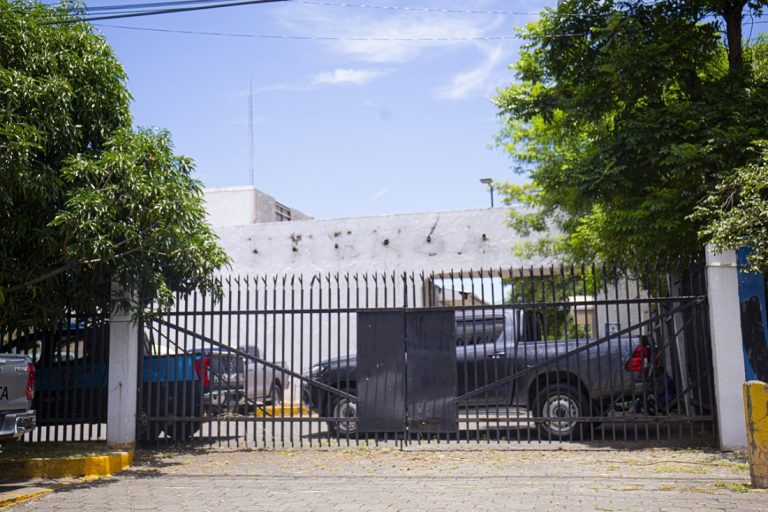
On International Journalists' Day, the forced closures of media outlets, raids, confiscations and arrests of journalists in Nicaragua keep the national press and the international community on edge, while the country is the scene of a war by Daniel Ortega and Rosario Murillo against freedom of the press and freedom of expression. The onslaught began in 2007, months after Ortega returned to power and, since 2018, has intensified in an escalation of attacks in an attempt to silence journalists, media and civil society, who denounce the regime's constant violations against human rights.
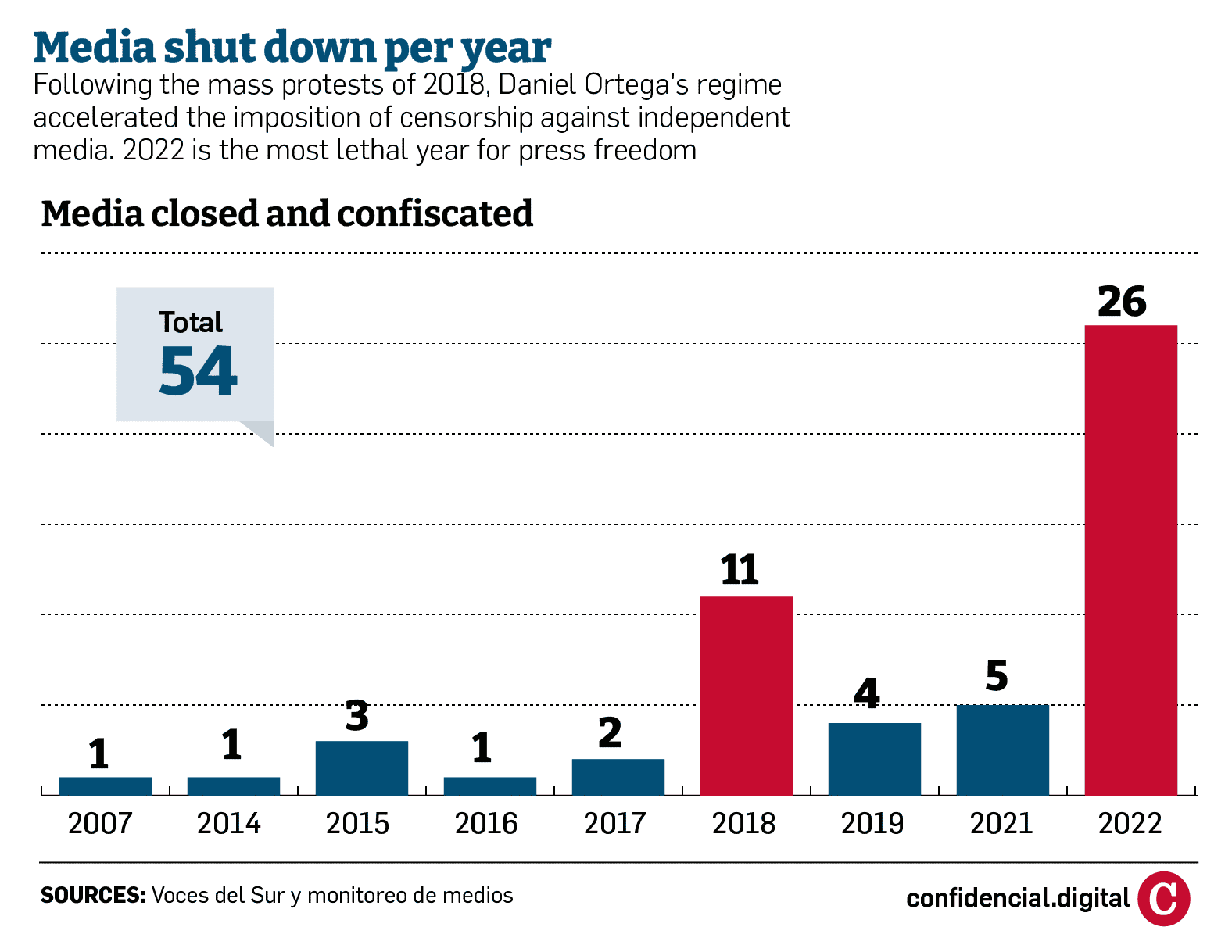
Ortega governs for his fourth consecutive term and, in these sixteen years, has closed 54 media outlets, newspapers, radio stations, television channels and digital media, some through the cancellation of their operating licenses, others through economic asphyxiation and, the most recent, through the seizure of their facilities and the confiscation of their assets.
Also 11 media workers and managers have been imprisoned in the last four years (eight of them still in prison), more than 140 journalists have been forced into exile, three reporters have been convicted for alleged slander (Kalúa Salazar, David Quintana and Elsa Espinoza), a national television channel (Channel 12) and three other media of national scope have been embargoed and forced to withdraw any kind of political or public interest content from their regular programming.
The imposition of censorship has escalated in 13 of Nicaragua's 17 departments and autonomous regions. In a first stage, between 2007 and 2017, through the Nicaraguan Institute of Telecommunications and Post (Telcor) and militants of the Sandinista National Liberation Front (FSLN), the regime assaulted and closed community radio stations and local channels such as: NotiWaslala, NotiCuá, Radio Palabra de Mujer, Radio Voz de Mujer, Canal 29, in Chinandega; Canal 50, in León; Radio Emperador and Radio Bosawás.
media workers and managers have been imprisoned between 2018 and 2021, and eight of them currently remain in prison.
reporters have been convicted of alleged libel: Kalúa Salazar, of La Costeñísima, in Bluefields; David Quintana, of Boletín Ecológico, and Elsa Espinoza.
Eight of eleven media workers and managers who have been jailed between 2018 and 2021 remain in prison. They are: Cristiana Chamorro Barrios, former president of the Violeta Barrios de Chamorro Foundation and presidential aspirant; Miguel Mora, co-founder and former director of 100% Noticias, presidential aspirant and political releasee; Pedro Joaquín Chamorro Barrios, former director of the FVBCh and member of the Ciudadanos por la Libertad (CxL) party.
Also under arrest are sports columnist and blogger Miguel Mendoza; political commentator Jaime Arrellano. In addition, the general manager of La Prensa, Juan Lorenzo Holmann (detained in August 2021) and La Prensa drivers: Carlos Lam and Mario Sánchez, were detained in August 2022.
Cristiana Chamorro, Pedro Joaquín Chamorro, and Juan Lorenzo Holmann are also managers of newspaper La Prensa, which has also been illegally confiscated.
Three other communicators were political prisoners of the regime in 2018 and released in 2019: Hansell Vásquez (independent communicator), Marlon Powell (radio journalist from Masaya) and Lucía Pineda Ubau (press chief of 100% Noticias).
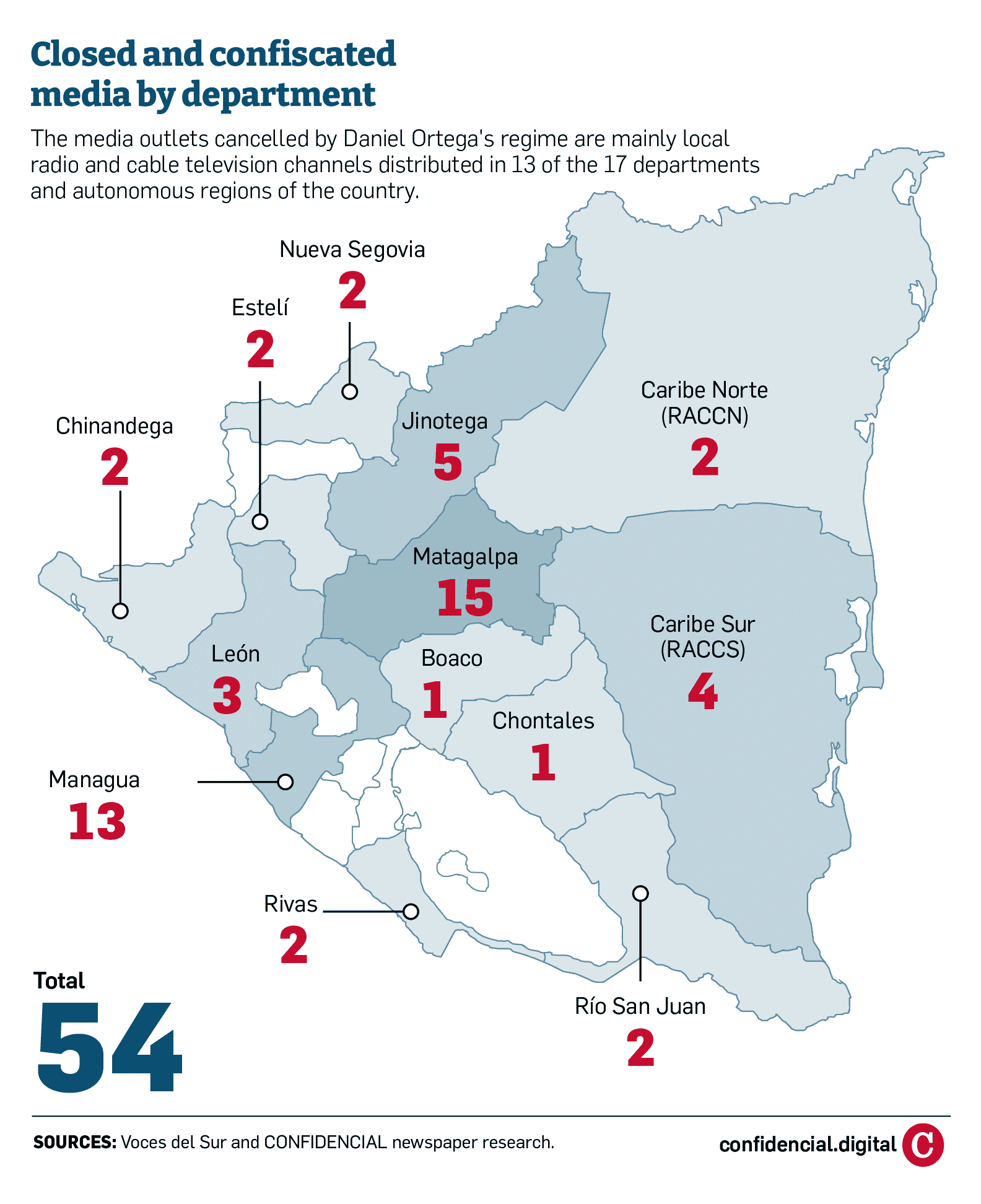
A second stage of this war against independent journalism began in 2018, when journalists and media documented and disseminated the Ortega massacre against the social outbreak of that year and the serious human rights violations, which left more than three hundred murdered, 1600 arbitrary detentions and more than 900 political prisoners, thousands of injured, dozens of disappeared and 100 000 exiled. In 2018 alone, 12 media outlets were stripped of their legal status, assaulted and confiscated: Radio Darío, Radio Amerrisque, NotiDalia, NotiWiwilí, NotiPantasma, Radio Stereo Apante, Radio Jerusalén, Radio Humedales, Radio Voz Juvenil, CONFIDENCIAL and 100% Noticias.
Orteguismo did not achieve its goal of silencing all the independent media that were attacked and confiscated. Radio Darío de León, -infringed on April 19, 2018-, CONFIDENCIAL and Esta Semana -assaulted and occupied on December 13, 2018- and 100% Noticias -assaulted and occupied on December 21, 2018, along with the kidnapping of journalists Miguel Mora and Lucía Pineda Ubau- continue to report through their digital platforms.
The special rapporteur for freedom of expression of the Inter-American Commission on Human Rights of the Organization of American States (OAS), the Colombian Pedro Vaca, highlighted during a working tour in Costa Rica, in July 2022, that “despite the purpose of silencing that is absolutely clear and evident, the Nicaraguan press, even from exile, has made an effort to continue reporting”.

violations of press freedom have been reported between April 1, 2018 and March 31, 2022, according to the organization Voces del Sur.
As of 2019, the regime's onslaught reached the national media. El Nuevo Diario, the second oldest newspaper in Nicaragua, financially suffocated, closed its publication on September 27, 2019. That same day the metropolitan newspapers Metro and Q'hubo were also closed. And in the following months local radio stations such as: Radio Alegre, Única; Radio La Ley and Radio Universidad followed.
In this context of censorship and repression, in 2021, CONFIDENCIAL and 100% Noticias were illegally confiscated, as well as the organizations and foundations that worked in the promotion and defense of press freedom in Nicaragua: the Violeta Barrios de Chamorro Foundation (FVBCh), the Association of Journalists of Nicaragua (APN) and Journalists, Writers and Storytellers (PEN - Nicaragua).
In order to imprison journalists and citizens, the regime created a legal framework that restricts the public freedoms of Nicaraguans. With the approval of the Law for the Regulation of Foreign Agents, the Special Law on Cybercrimes and the "Sovereignty Law" at the end of 2020, the Ortega regime tried to give a semblance of legality to its actions against the independent press and civil society organizations. As these laws entered into force in early 2021, they coincided with the worsening of press freedom violations.
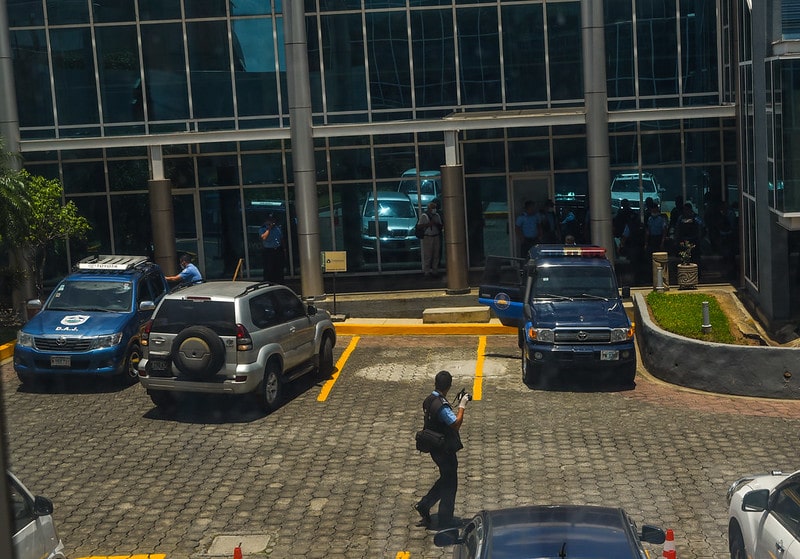
The Public Prosecutor's Office also participated actively in this war against press freedom. As of May 24, 2021 that institution interrogated 55 journalists and media owners, according to Journalists and Independent Communicators of Nicaragua (PCIN). The prosecutors questioned the journalists about their relationship with the FVBCh, inquired about the operation of the independent media and in some cases threatened them with criminal cases using the Special Law on Cybercrimes, known as the “Gag Law” approved in October 2020.
"We had to forcibly remove the staff because people dressed as civilians were arriving at the homes of other collaborators, editors, publishers, and photographers, asking for them, sending the message that the regime knew who they were, what they were doing, and we considered that it was no longer safe to continue working with a regime that has criminalized journalistic work".
Eduardo Enriquez, editor in chief of the newspaper La Prensa.
On August 13, 2021, the Ortega regime took the facilities of the newspaper La Prensa, the oldest in the country, by force. The assault occurred hours after the newspaper denounced that it had run out of paper to continue circulating nationally, due to the seizure of the raw material of the last Nicaraguan newspaper by the General Directorate of Customs (DGA) in a fiscal warehouse. The following day, the general manager of the newspaper, Juan Lorenzo Holmann, was taken under false pretences to the Dirección de Auxilio Judicial or El Chipote, where he was later accused, tried and sentenced to nine years in prison for the alleged crime of money laundering.
On July 6, 2022, after the coverage by the newspaper La Prensa of the expulsion of 18 Missionaries of Charity of Mother Teresa of Calcutta, the police unleashed a manhunt against journalists and also kidnapped, on July 6, two drivers of the newspaper. Both were taken from their homes and transferred to El Chipote, where they remain detained “under investigation”, without the authorities of the regime specifying the reason for the investigation.
The arrests were followed by raids on the homes of several journalists, photographers and newspaper staff. There were also “visits” and threats to former employees of the newspaper. This situation forced La Prensa to take its staff into custody and subsequently to remove them from the country.
The editor-in-chief of La Prensa, Eduardo Enríquez, regretted that “it is no longer safe” to continue doing journalism from Nicaragua.
With the persecution of La Prensa, the government provoked a new wave of more than 40 journalists who were forced to go into exile.
On August 23, the dictatorship of Daniel Ortega and Rosario Murillo made official the theft of the assets and building of the newspaper La Prensa, one year after the National Police forcibly occupied its facilities and arrested its general manager. In the stolen building, the regime installed the “José Coronel Urtecho” Cultural and Polytechnic Center, under the administration of the National Technological Institute (Inatec).
If in 2021 a worsening of press freedom violations prevailed, 2022 has been a lethal year for journalists and local media in Nicaragua. Between January and August 2022 a total of 26 departmental and municipal media outlets have been stripped of their legal status by the regime, mostly local stations that were located in the north of Nicaragua and belonged to the Catholic Church. The closure of these media occurred at the same time as the arrest of a dozen priests critical of the regime.
At the beginning of the year, the local channel Condega Visión and Radio Católica de Bluefields were forced to close their transmissions. Then the newspapers Voz Católica, a Church publication, and Trinchera de la Noticia, whose offices were also raided by the police, were shut down. In May, the regime's onslaught continued with the closure of the Catholic Channel of Nicaragua, belonging to the Episcopal Conference of Nicaragua (CEN), which in 2018 was an intermediary in a failed national dialogue between the regime and civil society.
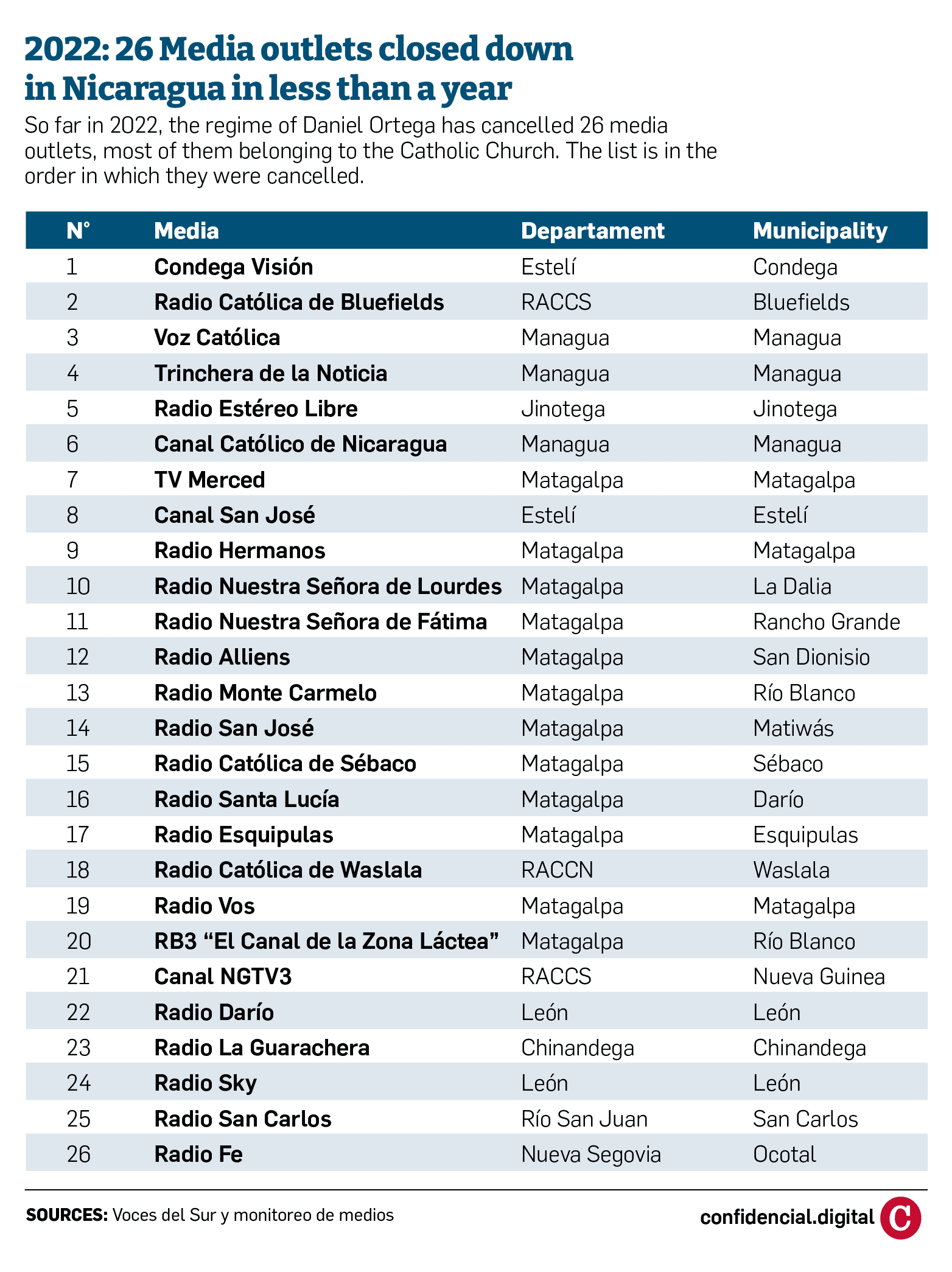
The most recent of the attacks was recorded in early August 2022, when the director of Telcor, Nahima Díaz Flores (daughter of Francisco Díaz, the sanctioned director of the Police and Daniel Ortega's in-law), ordered the closure of local channels: TV Merced, Canal San José, Radio Hermanos, Radio Nuestra Señora de Lourdes, Radio Nuestra Señora de Fátima, Radio Alliens, Radio Monte Carmelo, Radio San José, Radio Católica de Sébaco, Radio Santa Lucía, Radio Esquipulas and Radio Católica de Waslala, all belonging to the diocese of Matagalpa and Estelí.
At the same time Radio Vos and RB3 “El Canal de la Zona Láctea”, in the department of Matagalpa, were also cancelled. Days later, Canal NGTV3, in Nueva Guinea; Radio Darío and Radio Sky, in León; Radio La Guarachera, in Chinandega; Radio San Carlos, in Río San Juan; and Radio Stereo Fe, in Nueva Segovia.
Telcor's argument is that the stations in the diocese of Matagalpa did not have operating permits. However, Monsignor Rolando Álvarez -currently a political prisoner under house arrest- clarified that he himself submitted all the required documentation since 2016, but they “never received answers as is already the custom of the Government in some and many other cases”.
In the regime’s war against independent journalism, journalists and media outlets struggle to overcome censorship. CONFIDENCIAL, Esta Semana and the daily La Prensa continue to report with their editorial staff in exile; 100% Noticias and Radio Darío evolved to digital platforms to continue reporting. Likewise, Radio Vos, the Catholic Channel of Nicaragua, TV Merced and the stations of the diocese of Matagalpa continue to broadcast through social networks.
Other independent programs that have managed to circumvent the censorship of the Ortega regime are: Café con Voz, which in 2018 was canceled from local television channels, but continues to operate through digital platforms and social networks. Also, Onda Local, which was suspended in 2021 due to pressures against Radio Corporación.
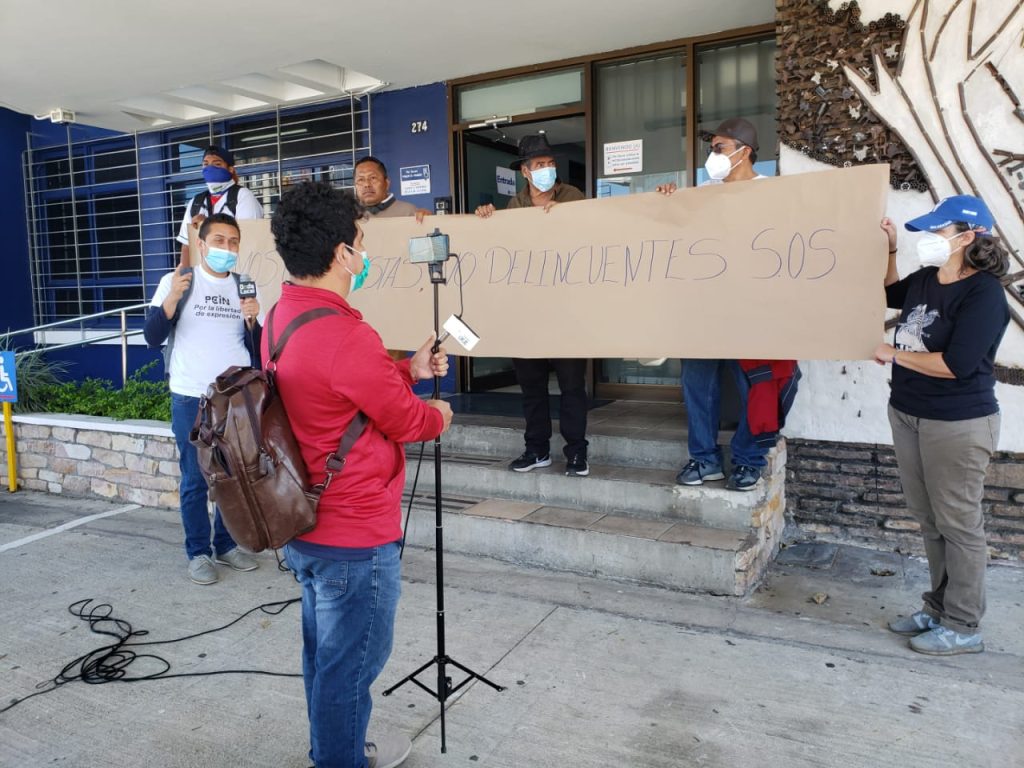
As of 2018, digital media were also born: Despacho 505, Nicaragua Investiga, Nicaragua Actual, La Lupa, Divergentes, República 18, Galería News, among others.
The editor of the newspaper La Prensa and director of the magazines Domingo and Magazine, Fabián Medina, considers that Nicaraguan journalism has had to “reinvent itself in exile or in hiding”, due to the constant attacks of the regime of Daniel Ortega and Rosario Murillo, but “we continue to fight the battle” and “we have the obligation” to avoid a news blackout in Nicaragua. Despite the siege, criminalization, closure and confiscation of the media, he emphasized, “the regime has not defeated journalism”.
This article was originally published in Spanish in Confidencial and translated by Our Staff.
PUBLICIDAD 3M
Confidencial es un diario digital nicaragüense, de formato multimedia, fundado por Carlos F. Chamorro en junio de 1996. Inició como un semanario impreso y hoy es un medio de referencia regional con información, análisis, entrevistas, perfiles, reportajes e investigaciones sobre Nicaragua, informando desde el exilio por la persecución política de la dictadura de Daniel Ortega y Rosario Murillo.
PUBLICIDAD 3D